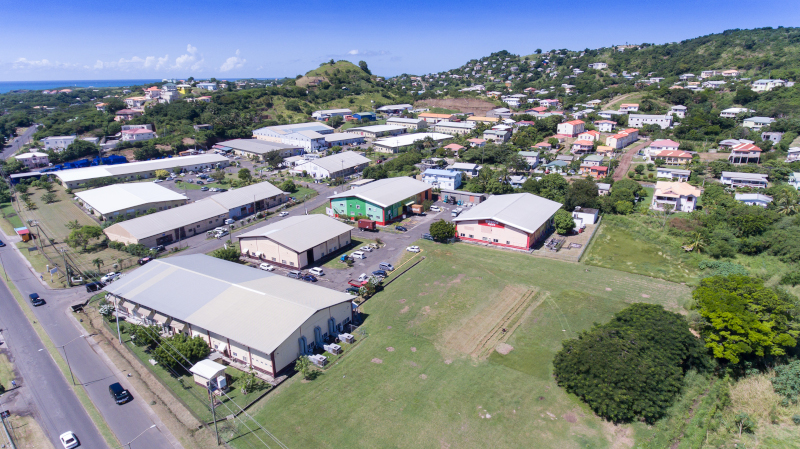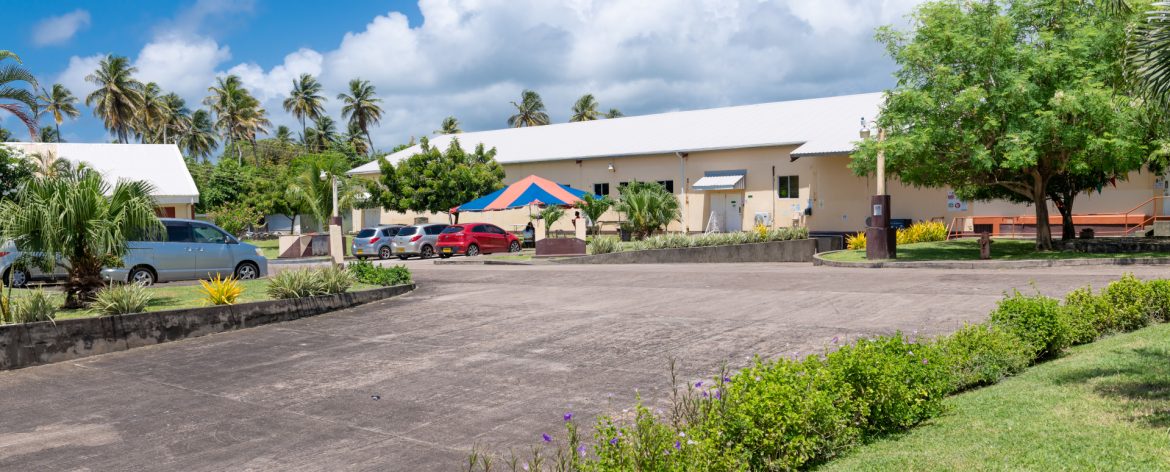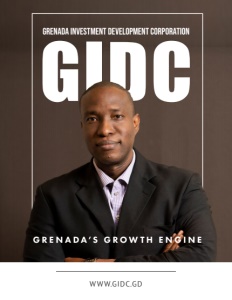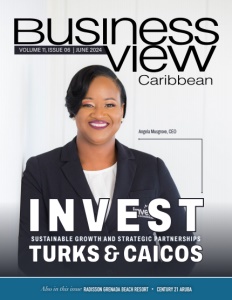Grenada Investment Development Corporation (GIDC)
Grenada’s Growth Engine: Shaping the Island’s Economic Future
Driving economic growth through strategic investments, innovative policies, and robust infrastructure development.
The Grenada Investment Development Corporation (GIDC) has been at the forefront of Grenada’s economic development since its inception in 1985. Operating as a statutory body, the GIDC functions as the island’s key economic development agency, fostering growth through its three strategic business units: investment promotion, facilities management, and business development. Ronald Theodore, the CEO, provides an in-depth look into the organization’s operations and objectives.
“The GIDC was established to promote and facilitate investments in Grenada,” Theodore explains. “Our investment promotion unit is dedicated to positioning Grenada as a prime investment location and assisting local and foreign investors. We also engage in policy advocacy and offer incentives for priority sectors.” These incentives are crucial for attracting investment, Theodore elaborates, as they provide significant benefits to qualified investors.
The facilities unit is pivotal in the GIDC’s operations, serving as the primary revenue generator. Theodore highlights that the GIDC manages three industrial parks across Grenada, housing around 60 tenants. These tenants operate in diverse sectors, including call centers, manufacturing, and warehousing.
Beyond investment promotion and facilities management, the GIDC is committed to nurturing the island’s small and medium-sized enterprises (SMEs) through its business development unit. “Our goal is to help these businesses grow stronger,” Theodore asserts. The unit offers comprehensive support, including business planning, name and company registration, and demand-driven training programs.
The shared service unit supports these three primary units and enhances the GIDC’s overall efficiency by providing legal, human resource, and research services. This structure allows each unit to operate effectively, contributing to the corporation’s overarching mission of economic development.
Targeted Investment Initiatives
The GIDC is taking proactive steps to elevate its investment profile in an increasingly competitive global market. By crafting detailed investment opportunities and focusing on targeted outreach, the GIDC aims to attract significant foreign investments to Grenada.
“We are embarking on a more targeted investment approach,” Theodore explains. The GIDC has developed comprehensive profiles for various projects, recognizing the importance of showcasing specific investment opportunities. These profiles include critical details such as investment costs, potential locations, available incentives, and expected returns. “For instance, if there’s a need for cold storage facilities on the island, we develop an opportunity profile that indicates the investment cost, where that facility can be located, the sort of incentives one can receive for doing that project, and projections like the return on investments,” he elaborates.
This strategic approach extends to various sectors. Whether it’s cold storage facilities or family hotels, the GIDC is tailoring its efforts to match investors with projects that align with their interests. Theodore shares, “In June, we’ll be hosting an investment mission from Dubai. We are looking at matching them with some of the opportunities we have developed and are currently developing to suit their needs.”
Theodore also highlights the GIDC’s collaboration with the Caribbean Association of Investment Promotion Agencies. “We believe the organization has great merit in promoting the region as an investment destination. Investors often look at regional blocks—Central America, the Middle East, or the Caribbean. Showcasing the Caribbean allows investors to explore opportunities within the respective islands,” he says.
Facility Expansions and SME Development
 The GIDC fosters economic growth through its robust facilities management and dedicated support for small and medium-sized enterprises (SMEs). Theodore shares recent developments in the GIDC’s industrial parks.
The GIDC fosters economic growth through its robust facilities management and dedicated support for small and medium-sized enterprises (SMEs). Theodore shares recent developments in the GIDC’s industrial parks.
“There have been some expansions,” he notes. “One is a paint manufacturer, with a parent company from Trinidad, that has grown its operations within the park to a 7,000 square foot building.”
Further enhancing infrastructure, the GIDC is on the cusp of a significant construction project. “We are about to embark on constructing a 40,000-square-foot facility,” Theodore reveals. With finances secured and the contractor selection process nearing completion, this new addition is set to increase the rentable space within the Frequente Industrial Park. “To date, we have about 12 interests in that space, and we look forward to the construction, which will take about ten months. This will position us to welcome new entrants into the park,” he adds.
On the SME front, Theodore underscores the GIDC’s efforts to formalize and support small businesses. “We have been trying to do a lot more promotion to get a lot of SMEs on board,” he states. This initiative focuses on transitioning businesses from the informal to the formal sector, enabling them to benefit from government support and services. “We’ve been having a lot of outreach programs and events, even going to schools,” he says.
“We need more entrepreneurs on the island, and we are looking at different strategies to encourage and support them,” he emphasizes. This proactive approach involves various activities to inspire young people to explore business opportunities and equip them with the necessary tools to succeed.
Government Policies and Incentives
Grenada’s appeal as an investment destination is further enhanced by the government’s business-friendly policies and fiscal incentives, designed to attract and retain diverse investments. Theodore outlines the comprehensive incentive program tailored to critical industries such as tourism, agribusiness, ICT, health and wellness, and energy.
“There are incentives that include not only tax breaks on customs duties for items coming through the port but also investment allowances and tax credits,” he says. These incentives are pivotal for making Grenada an attractive option for potential investors.
The government has been updating its incentive regime, initially established in 2016, recognizing the need for continuous improvement. “The cabinet set up a committee to review the regime and make recommendations for improvements,” Theodore explains. “That work has been done, and it’s now been sent to the cabinet for review and hopefully approval.” The updates aim to keep the incentives relevant, particularly in sectors like climate change and green economy initiatives.
Efforts to streamline the business environment extend beyond fiscal incentives. “The government continues to look at the doing business framework,” Theodore notes. One significant area of improvement is the digitalization of business processes, which can significantly reduce the time it takes to complete necessary procedures. “Digitalization can help, and those initiatives are underway,” he mentions. This includes carefully analyzing the consents and licenses required for different types of businesses and exploring ways to expedite these processes.
Citizenship by Investment Program
Grenada’s Citizenship by Investment (CBI) program continues to be a significant driver of foreign investment, offering a streamlined path to citizenship for investors and their families.
“The Investment Migration Agency handles the CBI program, but we maintain a close collaboration with them,” Theodore clarifies. “The program has been rebranded recently but continues to perform well for Grenada.” The CBI program has facilitated several high-profile hotel projects, contributing substantially to the island’s economic development. Theodore says, “The last project to open, completed in March, was the sixth CBI project. We see these projects constructed in a timely manner due to the alternative financing the program provides.”
Beyond real estate and hotel developments, the GIDC aims to diversify the sectors benefiting from the CBI program. “We’re looking to aggressively expand into agribusiness, ICT, energy, and other niche areas,” Theodore mentions. This expansion is part of a broader strategy to ensure that various sectors can tap into the program’s benefits, fostering a more robust economic landscape.
In tandem with the CBI program, the GIDC ensures that up-to-date statistical data is readily available for potential investors. “We keep an eye out for new data, collect it from various sources, and make it available for investors,” Theodore states. The GIDC works closely with Grenada’s embassies abroad, providing them with current and relevant statistical data. “My research team just sent new data on tourism, tourist arrivals, GDP, and inflation rates to our embassies,” he notes.
Moreover, the GIDC has developed an investment facilitation manual, a comprehensive toolkit for investors. “The manual will be updated in 2024,” Theodore announces. This update follows the completion of the incentive review, which has been prioritized to ensure that the manual reflects the latest policy changes.
“The manual outlines the processes, costings, and consents required from the various stakeholders involved in the investment process,” he explains. With around 19 players, including customs, physical planning units, the Inland Revenue Department, and the National Insurance Scheme, the manual provides a clear, concise snapshot of the necessary steps and costs.
 Priority Sectors and Infrastructure Collaboration
Priority Sectors and Infrastructure Collaboration
Grenada’s economic prospects are being buoyed by diverse sectors attracting foreign investment, with tourism, renewable energy, and health and wellness at the forefront. These sectors, supported by robust government policies and incentives, are crucial to the island’s development.
Theodore identifies tourism as a significant economic driver, particularly in niche segments. “We continue to see serious attraction in tourism investments, particularly in boutique hotels,” he explains. “Intercontinental is under construction, and there’s another major resort developing in the north of the island.” He highlights that increasing room stock is essential for accommodating growing tourist numbers.
Another robust sector is the yachting and marina industry, which has shown resilience even during global financial shocks. “The marina sector has consistently attracted investment. Boatyards and marinas are key areas for Grenada due to our location, natural beauty, and safety,” Theodore notes. This sector supports both recreational boating and necessary maintenance during hurricane seasons.
Renewable energy is also gaining traction, with significant interest in solar energy and waste-to-energy projects. Theodore emphasizes the importance of this sector, noting, “There’s a lot of interest in solar panel production and utilizing solar as an alternative energy source.” This aligns with global trends toward sustainable energy solutions and represents a forward-looking investment opportunity for Grenada.
The health and wellness sector is another priority. “There’s a new hospital being designed, and we’re looking for investors to develop this project,” Theodore reveals. Agribusiness continues to be a cornerstone for SME development, attracting numerous cottage industries and agro-processing ventures. Similarly, the BPO (Business Process Outsourcing) sector is also expanding, with a recent example being a US-based company increasing its presence on the island.
Enhancing Logistics and Infrastructure
Grenada’s focus on improving logistics and infrastructure is integral to these economic developments. “Logistics is a critical sector for us,” Theodore states. Our airport is expanding, and a feasibility study is underway for the port. These are opportunities for potential investors.”
Theodore stresses the importance of collaboration across various sectors and agencies. “Investment generation is not a one-person scenario. It involves the Inland Revenue, customs, and other players, including the Port Authority and airport,” he says. Effective coordination among these entities is crucial for facilitating smooth business operations and attracting further investments.
In conclusion, Grenada’s economic strategy is multifaceted, focusing on diverse sectors, from tourism to renewable energy, supported by solid infrastructure development. The collaborative efforts of the GIDC and various government agencies aim to create a favorable environment for investment, ensuring sustainable growth and prosperity for the island.
AT A GLANCE
Grenada Investment Development Corporation (GIDC)
What: Economic development agency driving investments and business growth
Where: Grenada
Website: https://gidc.gd/
PREFERRED VENDORS
Renegade Rum Distillery – https://renegaderum.com/
On the north-eastern shore of Grenada stands the award-winning Renegade Rum Distillery. A modern marvel and environmentally pioneering, it is designed to distil fresh sugar cane juice in order to produce terroir-driven cane rum spirits, each unique in its own right. We explore rum field by field; or we can layer spirits as cuvées to create natural rums of extraordinary complexity.
Sonover – https://sonover.com
Century21 Grenada – c21grenada.com
Six Senses La Sagesse Resort & Spa – https://www.sixsenses.com/en/resorts/la-sagesse/







